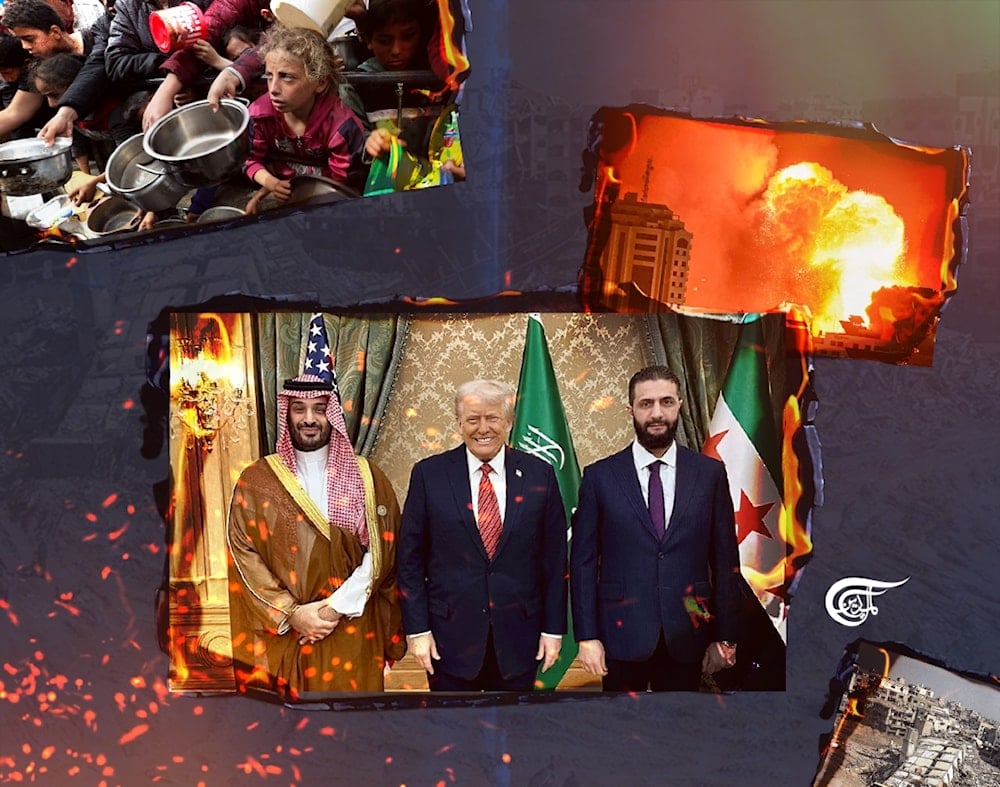Trump’s GCC tour shows growing US dependence on petro-surplus recycling
The U.S. is leveraging Arab wealth, especially from GCC states, to offset its economic decline through massive arms, tech, and infrastructure deals.
-

Saudi Arabia committed to a minimum of $600 billion in arms and technology purchases as well as joint ventures with the giants of Silicon Valley (Illustrated by Ali Al-Hadi Chmeis to Al Mayadeen English)
The US is doubling down on using Arab wealth to prop up its weakening economic system.
Donald Trump triumphantly returned from his tour of key Gulf Cooperation Council states last week, touting the trillions of dollars-worth of business he had secured for American business.
The collective commitments of the three states do indeed cumulatively exceed $2 trillion and even if only considering the deals signed, they still represent the largest commercial procurements in American, or indeed global history.
Saudi Arabia committed to a minimum of $600 billion in arms and technology purchases as well as joint ventures with the giants of Silicon Valley. Qatar signed up to a deal that would see its national airline single-handedly propel the beleaguered aerospace giant Boeing from its current doldrums. In total Doha committed to a potential $200 billion in purchased wide-body aircraft. The United Arab Emirates, the first state to publicly raise the $1 trillion figure, threw money at Washington’s cutting-edge industries: artificial intelligence, computer chips and propping up US domestic metal processing.
While the scale of this transfer of wealth from the Arab world to the United States is very much unprecedented, the underlying nature of the transfers and the relationship they represent, is not.
A half-century-old arrangement
US diplomats originally turned to the energy-producers of West Asia and North Africa in the early 1970s after Washington voluntarily collapsed the global financial order, the Bretton Woods system, which was based on direct convertibility of US dollars into gold. In an arrangement which had been widely known of but not proven until relatively recently, the Nixon-Ford administration negotiated for the Saudis to “recycle” their ballooning oil profits into buying US Treasury bonds, depositing with American banks and contracts for American corporations, primarily construction and arms deals. While never formalized as a treaty, the agreement crucially also involved Riyadh’s sole acceptance of US currency as payment for their energy exports, a move which generated massively increased global demand for the dollar. This arrangement of recycling “petrodollars” was expanded by 1975 to all OPEC states, in a way that reinforced the dollar’s global reserve status.
Just the beginning?
While in Riyadh, Trump deigned to undo sanctions on Syria dating back more than 40 years. This will give Washington either directly or through its regional surrogates, access to Syria’s reconstruction market worth around a quarter of a trillion dollars to as much as $400 billion.
Besides the GCC market, Iraq has also been a key regional prize. Earlier this year, Trump rescinded sanctions waivers that allowed Iraq to buy energy from Iran. Baghdad’s likely fallback will now be an electricity system in which American companies expect to play a preferential role. Shortly prior to Trump’s regional trip, Iraq also received the largest US commercial delegation in the history of the two countries’ ties. It is not improbable that Washington expects to access the same levels of wealth-transfer from Baghdad and Damascus.
The sheer scale of the regional concessions being given to Trump tell the opposite story to that presented, of a disinterested US “withdrawing” from the region. What instead is occurring is the resetting of regional states’ tributary status to Washington, on even more exploitative terms. In exchange for “security guarantees” (in effect massive arms sales that enrich US companies) Washington is granting itself the right to unheard of levels of economic penetration, amounting to sums greater than most economies’ annual GDP.
Given Washington’s growing need to prop up its anemic economy, mass wealth transfers from Arab states are unlikely to stop with the three above-mentioned GCC states. This is not simply driven by the personal corruption of the Trump family, but by the deepening costs of the global trade war. The loss of the Chinese market alone has the capacity to render some of the most lucrative American industries non-productive. This was demonstrated particularly bluntly with Beijing’s blanket rescinding of orders for US-made commercial aircraft. For Washington and the corporations that run it, this cold mathematical logic requires either China’s replacement with a similarly sized market or customers with the financial resources to keep the foundations of the US economy in business.
For the Americans, it is just as well that they had such partners waiting in the wings. It does raise the question of what happens on the day it no longer has such compliant friends to call on.

 Samuel Geddes
Samuel Geddes
 5 Min Read
5 Min Read











